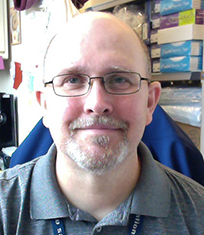
Todd D. Prickett, Ph.D.
- Center for Cancer Research
- National Cancer Institute
- Building 10 CRC, Room 3-5762
- Bethesda, MD 20892
- 240-858-3778
- prickettt@nih.gov
RESEARCH SUMMARY
Dr. Prickett supervises the Next-Generation Sequencing (NGS) Genomic Core Facility for the Surgery Branch overseeing development and implementation of bulk and single-cell sequencing technology used as an important tool for adoptive cell therapy.
Areas of Expertise

Todd D. Prickett, Ph.D.
Publications
Internal checkpoint regulates T cell neoantigen reactivity and susceptibility to PD1 blockade
A phenotypic signature that identifies neoantigen-reactive T cells in fresh human lung cancers
Durable Complete Response from Metastatic Melanoma after Transfer of Autologous T Cells Recognizing 10 Mutated Tumor Antigens.
Molecular pathways: dysregulated glutamatergic signaling pathways in cancer.
Exon capture analysis of G protein- coupled receptors identifies activating mutations in GRM3 in melanoma
Biography

Todd D. Prickett, Ph.D.
Dr. Prickett earned a B.S. in Biochemistry from the Virginia Polytechnic Institute and State University. Afterwards he earned his Ph.D. from the School of Medicine at the University of Virginia. Dr. Prickett then completed a postdoctoral fellowship in the Cancer Genetics Branch, National Human Genome Research Institute, working on functional genomic studies of highly mutated gene families (receptor tyrosine kinases and G-protein coupled receptors) in metastatic melanoma samples for clinical trial patients. Subsequently, he completed additional training within the Surgery Branch at NCI on utilization of data from NGS sequencing for T lymphocyte screening of tumor-reactive T cells for use in adoptive cell therapy. Dr. Pricket then became a staff scientist in the Branch where he serves as manager of the NGS Genomics Core Facility. All clinical and non-clinical patient samples are processed by the facility using bulk and/or single-cell technology generating NGS libraries, sequenced, and then used in adoptive cell therapy clinical trials.
